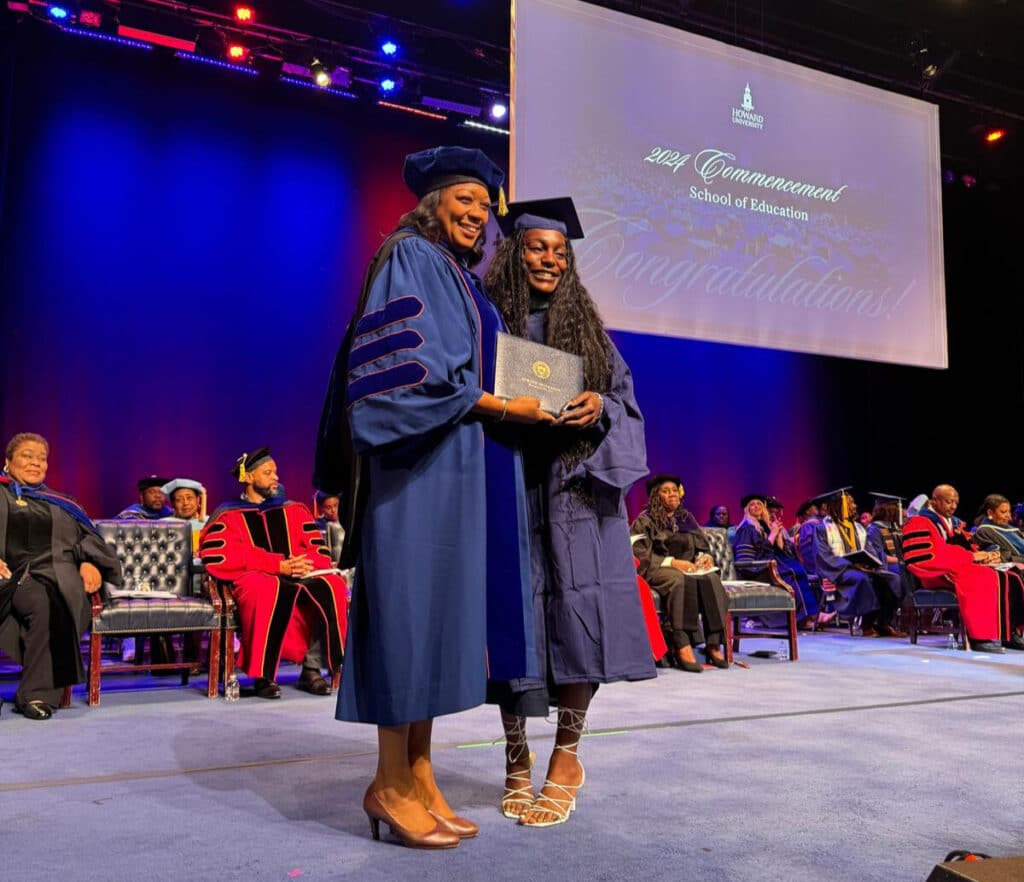Mojoko Esu is a literacy interventionist at Digital Pioneers Academy. She recently graduated with a Master’s degree in Educational Leadership and Policy Studies from Howard University. In this interview, Mojoko shares her journey to becoming an educator at DPA, her teaching philosophy, and what makes DPA a special place to grow as a leader.
Q: What brought you to DPA?
What attracted me to DPA was the mission. Through some teacher friends, I got a chance to meet DPA founder Mashea Ashton and even visit the school and meet with students. I learned DPA was not just about preparing students for academic success, but also about supporting students in developing the strength of character to thrive in this world as a Black person. Then I saw a posting for a teacher opening on Indeed.com. Even though I knew I eventually wanted to become a leader, I wasn’t quite ready to leave the classroom. I wanted to continue to strengthen my teaching muscles.
Q: What makes DPA a great place to grow?
Digital Pioneers Academy is a community that believes in Black excellence. Everyone’s North Star is building the next generation of innovators. It’s not just words on a mission statement. I’ve seen how powerful this is for our students. I can tell them “I was just like you” and they get it.
Q: What exactly does it mean to be a “literacy interventionist?”
I’m an English teacher with a specialized focus. I help those students who need the most support through small-group instruction.
Q: How would you describe DPA’s approach to special education?
At DPA, we ensure all students are receiving the services required by their Individualized Education Plan (IEP). We also have some scholars without an IEP who require extra individualized support. I am equally committed to meeting these students’ learning needs. I teach the same lesson to each student but with different levels of structure and support. My goal is to ensure all of my students achieve at high levels.
Q: What does this look like in practice?
As a literacy interventionist, I work with students in small groups to make sure they all believe they can master the material. In my experience, the secret is cultural competence. Many of my students see themselves in me. I meet the scholars where they are and make content relevant to them. Take Romeo and Juliet, for example: my students may not immediately relate to life in 16th-century Italy, but they sure can relate to love and rivalries.
Q: Do you have any achievement results you can share?
Yes! Following the implementation of our newly piloted intervention program, 80% of scholars on my caseload displayed significant growth from their ANET 1 to ANET 2 scores. I am excited to see how much growth our students make on DC CAPE results this spring.
Q: What made you want to become a teacher?
Growing up in Detroit, I didn’t have to put forth much effort to get decent grades. But something happened my senior year that put me on a path to becoming a teacher. My Detroit public school received an award for being in the top 100 public schools in terms of achievement in the state of Michigan. Being top 100 didn’t seem particularly impressive until I realized my school was the only top 100 school in the City of Detroit! I was shocked. My school didn’t have basic resources. Students often had to sit on desks because there weren’t enough chairs, textbooks were falling apart, and bathrooms were in disrepair. From this experience, I became awakened to the reality of how desperate the conditions must be in Detroit for public schools to not rank in the top 100. And I wanted to do something to address this inequality.
Q: Was there one moment when you knew for sure this was your destiny?
My first experience teaching K-12 students was during my junior year in college at Howard University. After only a few weeks, I realized I could see myself as a teacher. At the time, I was considering some other careers in public service. But I realized if kids can’t read, they would fall short of achieving their potential. I decided to become a literary specialist.

Q: You recently graduated from Howard University with a Master’s degree in EducationalLeadership and Policy Studies. How has this degree influenced the way you approach teaching?
My teaching has certainly been enhanced as a result of my Master’s program at Howard University. Since my first classroom experience 8 years ago, I have always leaned into the principles of servant leadership, but I now think more about the waysin which I can revise policies and build systems that are able to serve scholars best, as opposed to just my own individual practices.
Q: What have you learned so far at DPA that you expect to take with you on your leadership journey?
Special circumstances require special solutions. In the face of seemingly insurmountable challenges, there is always a world of possibilities. We just have to be willing to be creative, open to growth, and focused on expansion opportunities for all.
Learn more about Digital Pioneers Academy or join our team.
